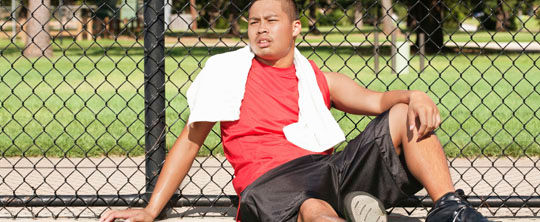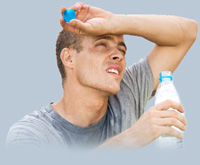
If your energy is flagging or you just can’t seem to get out from under the dark cloud that’s been following you around all day, relief may be as close as a tall glass of water. Two new studies suggest that even mild dehydration—as little as a 1.5 percent loss of normal water volume—can cause a host of maladies, including headaches, fatigue, difficulty concentrating and adverse mood.
A team of researchers led by Dr. Lawrence E. Armstrong at the University of Connecticut’s Department of Kinesiology completed two separate studies—one focusing on men and the other on women; both studies followed the same protocol.
The first study involved 25 healthy, active women in their early 20s, while the second study included 26 healthy, active males in their late teens and early 20s; both groups typically exercised 30 to 60 minutes per day. Three times over a four-week period, each participant was asked to walk on a treadmill to induce dehydration (the night before each evaluation, the individuals were well-hydrated). After each exercise bout, all participants were given a series of cognitive tests to measure concentration, learning, memory, reaction time, reasoning and vigilance, the results of which were compared to tests given when the subjects were not dehydrated.
For the women’s study, the researchers concluded that mild dehydration caused headaches, fatigue and difficulty concentrating; the women also felt like the tasks were more difficult when they were slightly dehydrated, although their performance did not appear to be diminished.
Among the men, mild dehydration appeared to make mental tasks involving memory and vigilance more difficult and, like the women, the young men exhibited signs of fatigue, tension and anxiety. However, according to researchers, adverse changes in mood and other symptoms such as fatigue and headaches were “substantially greater in females than in males, both at rest and during exercise.”
Interestingly, the researchers conclude that it doesn't matter if dehydration is caused by vigorous exercise or simply from not consuming enough water while being sedentary—the adverse effects are the same. Furthermore, the state of being dehydrated may be a significant obstacle to feeling motivated to exercise.
![]()
 Waiting to feel thirsty before drinking fluids is not a wise approach, says Armstrong, because the body’s thirst sensation doesn’t really kick in until we are 1 percent to 2 percent dehydrated. “By then,” explains Armstrong, dehydration is already setting in and starting to impact how our mind and body perform.”
Waiting to feel thirsty before drinking fluids is not a wise approach, says Armstrong, because the body’s thirst sensation doesn’t really kick in until we are 1 percent to 2 percent dehydrated. “By then,” explains Armstrong, dehydration is already setting in and starting to impact how our mind and body perform.”
“In both sexes, these adverse mood changes may limit the motivation required to engage in even moderate aerobic exercise,” says study co-author Dr. Harris Lieberman. “Mild dehydration may also interfere with other daily activities, even when there is no physical demand component present.”
Clearly, as these studies demonstrate, maintaining proper hydration—whether you’re exercising in extreme heat or working at your desk—is essential for keeping those health habits on track and maintaining a high level of overall health and well-being.
Sources:
Armstrong, L.E. et al. (2012). Mild dehydration affects mood in healthy young women. The Journal of Nutrition, jn.111.142000v1 142/2/382
Ganio, M.S. et al. (2011). Mild dehydration impairs cognitive performance and mood of men. British Journal of Nutrition, 106, 1535−1543.